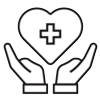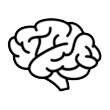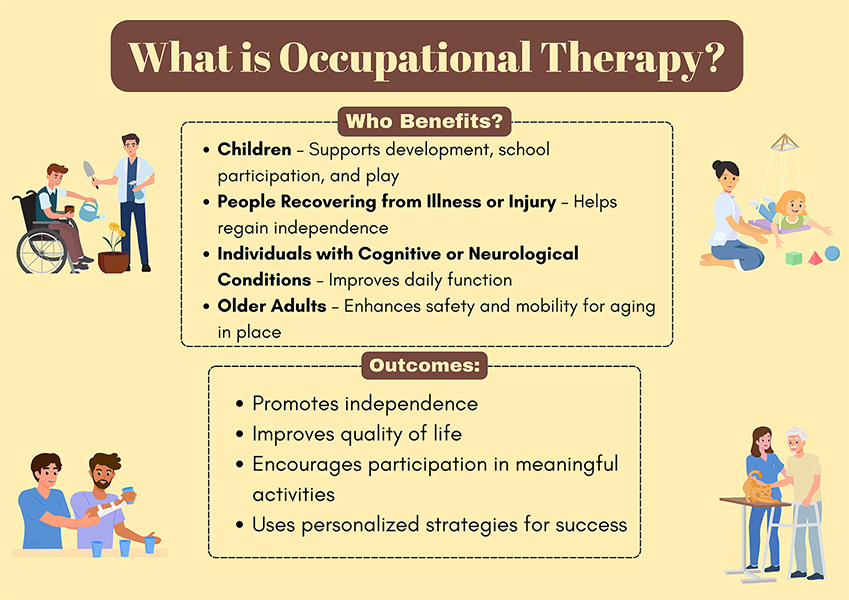





The mission of this resource is to increase awareness and educate individuals regarding the cognitive differences that may arise after cancer treatment and can ultimately affect participation in daily activities, such as school and work.Cognition is the process of gaining, understanding, and applying knowledge.
This resource provides information regarding the most common cognitive changes seen post-cancer treatment in CHILDREN and ADULTS, how this affects their quality of life, evidence-based resources, as well as information about how occupational therapy can play a role in increasing quality of life among cancer survivors.
“Cognitive Healing – Beyond the Treatment” has been created by an Occupational Therapy Doctoral Student, fulfilling their Doctoral Capstone Project for the New York Institute of Technology. This resource was designed with the support of the National Coalition for Cancer Survivorship.

Occupational therapy (OT) is a healthcare profession that assists individuals of all ages to participate in meaningful activities by addressing physical, cognitive, emotional, and social challenges.
Occupations are the everyday activities people do that are meaningful and important to them. Occupational therapists address various areas of life to support meaningful participation in daily occupations. “The Nine Areas of Occupation” encompass essential activities that contribute to overall well-being, independence, and quality of life.
Instrumental Activities of Daily Living (IADLs)
Play
Health Management
Work
Education
Leisure

For more information, please visit The American Occupational Therapy Association
Occupational therapy empowers individuals to fully participate in life, regardless of challenges they may face. For those recovering from cancer treatment, these challenges can include cognitive, physical, emotional, and social difficulties. Treatments such as chemotherapy, radiation, and surgery may cause long-term side effects, particularly cognitive changes like difficulties with memory, thinking and organization skills, planning, focusing, and managing time. These can impact daily routines, school, work, and social interactions for both children and adults.
For individuals transitioning back into activities of daily living, occupational therapy is an important supportive service. Here is how an occupational therapist can help:
For more information regarding Occupational Therapy and cancer, visit Occupational Therapy and Cancer
About 75% of cancer survivors have reported experiencing cognitive difficulties post-cancer treatment (Ahles, Root, & Ryan, 2012). Cancer treatments can cause trouble with memory, attention, thinking skills, and how fast the brain processes information. This can make learning and speaking harder. Other common side effects seen are:
For more information, visit Cognitive Impairments Associated with Cancer
Pediatric cancer treatment can create disruptions within the development of the brain and body, which can lead to memory, concentration, attention, and learning impairments, ultimately resulting in decreased education participation. Because of treatment, about 40-60% of pediatric cancer survivors encounter neurocognitive changes regarding executive functioning, memory, attention, visual processing, and visual motor function (Semendric et al, 2023).
For more information, visit American Cancer Society – Changes in Memory, Thinking, and Focus
Knowing how to address the cognitive challenges faced following cancer treatment can sound like an overwhelming journey. However, with the tools and recommendations provided, cancer survivors can use these within their daily lives to exercise the mind and increase cognitive abilities.
Asking questions is a powerful form of self-advocacy—especially when it comes cancer survivors brain health. Not sure what to ask? Here are a few examples of what can be asked of the healthcare team to better understand and manage the cognitive changes after treatment! They’re designed to guide meaningful discussions, help cancer survivors understand what the symptoms and experiences, and explore tools that support clearer thinking and daily life.
For more information. visit: The American Cancer Society
Here are some more helpful strategies—whether for a child, teen, or adult—to support the brain and mind in school, work, and beyond.
Online gaming platforms can be beneficial for exercising cognitive abilities in several ways:
Online gaming tools can provide a structured, interactive way to improve cognition by engaging players in tasks that challenge various cognitive functions. Here’s how:
Although outcomes may vary, with repetition, as cancer survivors begin to grasp the understanding behind these cognitive training tools and accomplish them, they can then be applied to real life situations. For example, a child who has returned to school post-cancer treatment could use the memory strategies when studying for an upcoming test. For adults, one may implement active breaks throughout the day to get the body moving and giving the mind a rest before returning to work.
Below is a list of links to several online gaming platforms that engages the use of cognition to participate in the activity:
Press the buttons above to open a printable PDF/electronic device version of worksheet activities to promote cognitive function. NOTE: Some worksheets are only appropriate for printing purposes, but all are examples of activities that can be used to exercise our cognition.
For a full list of resources, download the PDF here: Cognitive Impairment Research and Learning
Contact / Feedback – A way for visitors to reach out with questions or feedback.
Gena Gurman, OTDS – ggurman@nyit.edu
New York Institute of Technology – Department of Occupational Therapy